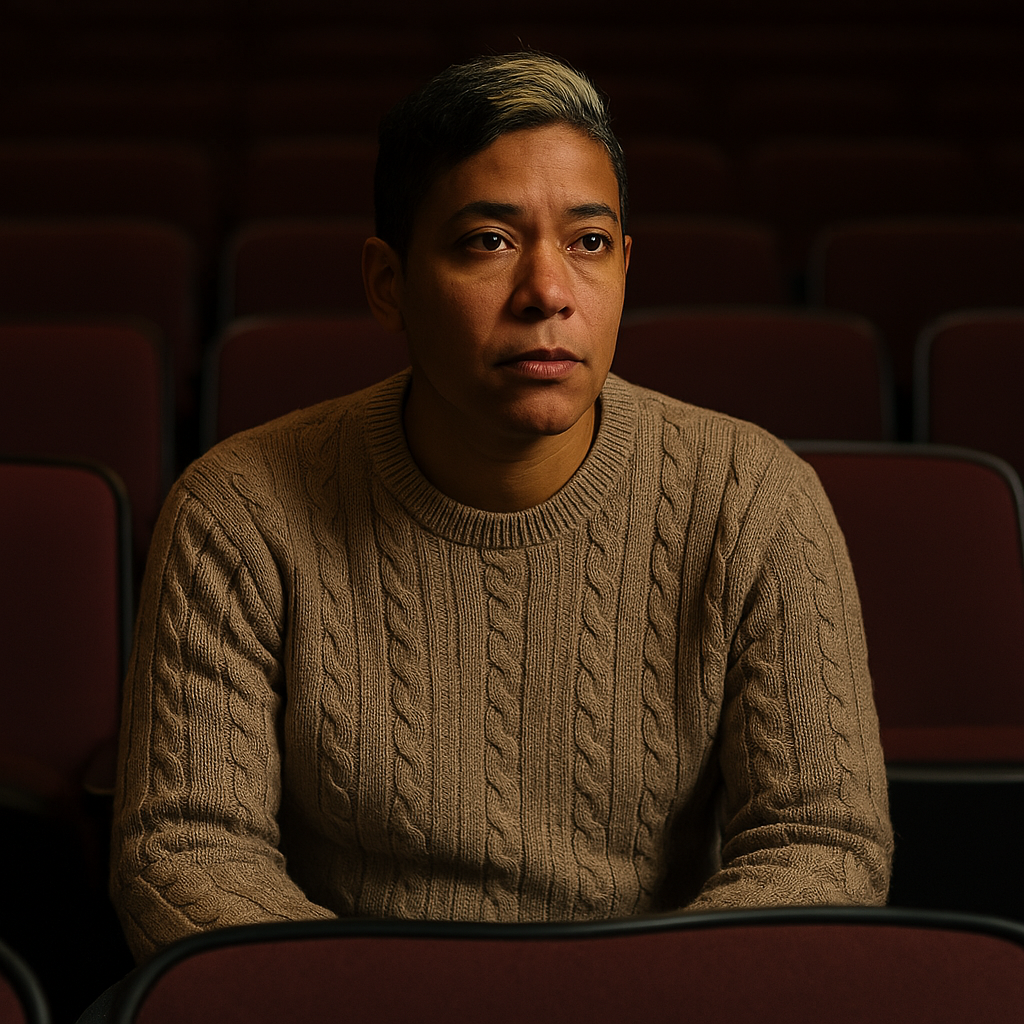Echo
(a.k.a. Leslie Echols)
Muse to Muses, Patron of the Arts
Once the heartbeat of Cleveland’s creative soul, Echo was a Satyr who defied easy categorization. They moved through the city’s musical halls, avant-garde theaters, street corners, and candlelit workshops like a spark born of Glamour itself—flaring, fleeting, and unforgettable. Gender-fluid in both appearance and presence, Echo shifted gracefully through their many facets: exuberant ringleader, aching poet, thoughtful mentor, and sharp-tongued critic. Their laughter was contagious, their anger righteous, and their capacity for inspiration seemingly endless.
In their prime, Echo nurtured mortal artists like a gardener tending wild vines, helping them flourish in a world that often crushed creativity beneath the weight of Banality. As a beloved staple of the Moondog Barony, Echo brought together wildly different Kithain and Kinain through the power of performance and shared expression. It’s whispered that Echo could pull Glamour out of thin air with a single note from their reed flute or a perfectly timed line in an experimental play.
But not all muses are immune to despair.
In 2021, Echo crossed paths with a mortal music critic named Tucker Funt, whose withering words had the eerie weight of something more sinister. The encounter left Echo deeply wounded in ways that no Satyr should be. Those close to them say the magic bled out of their voice. After a few last performances—fierce, brilliant, and raw—they fell into silence and retreated into solitude. By late 2024, rumors circulated that Echo had succumbed to permanent Undoing, and their fae soul faded into myth once more.
Their mortal self, still active in the local arts scene, continues directing underground theater productions, unaware of the luminous being they once were. Many local changelings avoid these shows; it’s said there’s an unsettling feeling in the air, as if something holy has been hollowed out.
Legacy
- Echo’s absence is still keenly felt. Their ability to ignite Glamour in others left an enduring impression on Cleveland’s artistic soul. Aspiring musicians, dancers, and dreamers often find their paths converging at places Echo once frequented—drawn, perhaps, by an echo of Echo.
- Though gone, some believe Echo’s stories are not yet finished. Rumors whisper that their most treasured creation—a strange and beautiful chimerical instrument—remains hidden somewhere in the city. Those who seek to recover it may find themselves swept into a larger mystery… or playing a part in helping Echo return.
- For those Kithain who still honor the power of art, Echo remains a patron spirit, a challenge, and a call to never stop creating.
Personality Characteristics
Representation & Legacy
Original Plays Written & Directed by Leslie Echols (aka Echo)
These showcase Echo's unique voice — bittersweet, layered, and mythically tinged.
“Glass Feathers” (2010)
A young girl discovers a feathered cloak in her grandmother’s attic that allows her to witness moments from her family’s past. A poetic meditation on generational wounds and unspoken love, blending fairy tale logic with raw realism.
“The Buttonhook Waltz” (2015)
Set in a dreamlike boarding house, seven guests are mysteriously drawn into a midnight dance that rewrites their regrets. Full of character-driven turns, and praised for its Eshu-like narrative twists and use of music and silence.
“The Bitter Road to Caraway” (2018)
A theatrical folk tale following two estranged siblings who must travel a surreal landscape in search of a missing friend. Echo’s most openly changeling-coded script, lauded for its metaphorical depiction of Bedlam and the Dreaming.
Established Plays Directed by Leslie Echols
These reflect Echo’s careful eye for adaptation, emotionally resonant casting, and subtle mythic overlays even within grounded scripts.
“The Curious Incident of the Dog in the Night-Time” (2012)
Echo’s early standout as a director. Their version brought a softened visual surrealism to the protagonist’s inner world and was noted for its powerful stillness and nuance.
“Eurydice” by Sarah Ruhl (2016)
Echo leaned into the uncanny, almost changeling-like elements of this script. They employed water, shadow puppetry, and reversed speech in places to mirror themes of memory and loss.
“Marjorie Prime” by Jordan Harrison (2022)
Part of Echo’s reclusive phase. Their interpretation was devastating in its emotional stillness, emphasizing decay of memory with stark visuals and little sound. One reviewer called it “like watching a bone-chilling winter settle into a living room like an ailing, recalcitrant grandparent.”
“Three Tall Women” by Edward Albee (2024)
Echo’s final real-world script before Twinless Star. The production was bleak and sharply psychological. Echo’s blocking often left characters isolated in stage corners, underlining their retreat from shared meaning.
Capstone
“Twinless Star” (2025) Original. Written & directed.
The haunting narrative of the unseen child and the family who cannot see him, appearing to be deeply allegorical of changeling trauma, identity, and the cost of hidden truths. It serves as Echo’s most personal and elegiac statement — and now a piece Dalia is determined to understand more deeply.
Other Contributions to the Cleveland Art Scene
Echo has also contributed to local art galleries and played with local bands (mostly jazz, and orchestral accompaniment with brass). These works and performances were lauded but did not get noteworthy buzz for Echo outside of the most devoted fans.




Comments